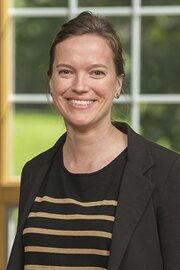
The Humanities Research Institute (HRI) at the University of Illinois Urbana-Champaign has announced the inaugural Interseminars project, led by professors Carolyn Fornoff of the Department of Spanish and Portuguese, Josue David Cisneros of the Department of Communication and Patrick Earl Hammie of the School of Art and Design.
Funded by a $2,000,000 grant from The Andrew W. Mellon Foundation, the Interseminars Initiative will fund three such projects over three successive years, each selected through a competitive application process. This initiative represents the latest thinking on how best to practice a genuinely collaborative and equitable commitment to graduate training in the public research university of the 21st century.
"Interseminars builds on SLCL's mission to foster interdisciplinary initiatives and innovative teaching in order to bring enhanced learning experiences to students," Fornoff said.
"The three faculty conveners represent different disciplines—cultural studies, communication, and studio arts—and we hope to attract a similarly diverse cohort of graduate students from a wide array of disciplines in the humanities and arts. As a group, faculty and graduate students will co-create the Interseminars syllabus. This provides grad students with a unique opportunity to gain hands-on experience in course creation and influence the direction of the coursework."
The first Interseminars project, developed by Fornoff, Cisneros and Hammie, is themed “Imagining Otherwise: Speculation in the Americas.” Referencing examples from TV’s "Lovecraft Country" to recent anti-racist activist efforts, the theme centers speculation as a method for looking differently at the world—both to critically assess its status quo and to reimagine how it could be different. Studying speculative forms in art and activism, they propose, can help guide scholarly and creative inquiry about crises ranging from climate change to systemic violence and immigration policy. The project’s work will be foregrounded in the knowledge and experiences of historically marginalized communities throughout the Americas, exploring how speculation has been and can be used to reframe the past, present and future.
"The theme that we chose was speculation, both as an object of study and as a method of scholarly analysis and artistic practice. All of us faculty conveners work on this topic from one angle or another. In my work, I am particularly interested in how speculative fiction in Latin America is a way that writers and artists engage with environmental crisis," said Fornoff.
"Rather than use art for its evidentiary function—to prove that climate change is real—speculative engagements with climate change tend to imagine how the world could be otherwise. To echo Brazilian Indigenous theorist Ailton Krenak, speculative forms of imagining the world, like dreams, do not avoid or evade the real, but are 'the place where we go in search of songs, cures, inspiration, and even solutions to practical problems that befuddle and elude us'."
Read the original HRI announcement here.